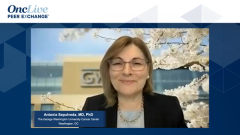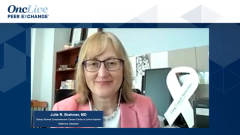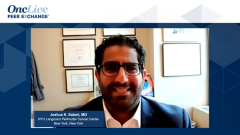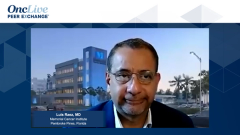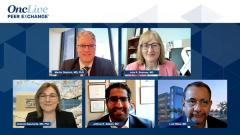
Choosing Between ALK Inhibitors in the Treatment of NSCLC
The expert panel discusses factors that influence treatment decisions when choosing appropriate therapy for patients with ALK-rearranged NSCLC.
Episodes in this series

Transcript:
Martin Dietrich, MD, PhD: Maybe we can go around and get some of your thoughts about how you choose your individual inhibitors. Dr Raez, how do you pick your ALK [anaplastic lymphoma kinase] inhibitors in the first-line setting?
Luis Raez, MD: That’s a very hard question because we did 2 studies with lorlatinib. We had a lot of patients on lorlatinib some years ago. It’s a great drug and a lot of people are afraid of all the adverse effects and all of the mood changes, all the paresthesia, so they call it. But I guess once you get experience with that, it’s not as bad. Because I have people who say, “I use lorlatinib as the last option because I don’t want to deal with the adverse effects.” For me, the most important thing is with the data, we get the final data, what is the survival of all of this? If the survival of the sequence, alectinib, brigatinib, followed by lorlatinib, is better than the lorlatinib up front, or the lorlatinib is so good that the PFS [progression-free survival] or the OS [overall survival] is better than the sequence. The same thing that we did for EGFR, that we declared osimertinib is a winner.
That’s why, until that day, I think we can still use alectinib or brigatinib if you want. Maybe if you have a lot of brain metastases, as [Dr Sabari] said, I am more inclined to use lorlatinib for safety because we want to clear these brain metastases. We don’t want to use radiation anymore. However, remember, you are comparing 3 different studies, 3 different populations. The 100% in one study doesn’t mean it’s better than the 80% of another study. Those are the caveats. The only thing I don’t like in lorlatinib is having to document very nasty genetic aberrations when [lorlatinib does not work for a patient]. It’s very hard to rescue with the first-, second-generation inhibitor. But you may be lucky and your patient is still sensitive to ceritinib. That’s why we’re using now repotrectinib. We’re looking for new compounds because once a patient using lorlatinib get some weird genetic-resistant mutation, it’s very hard to break that. That’s why I’m still using alectinib for first line.
Martin Dietrich, MD, PhD: Dr Brahmer, I assume you’re not going to design a sequencing trial in the near future with these survival dates. But how do you pick your first-line choice here for ALK inhibitors?
Julie R. Brahmer, MD: I use a lot of alectinib. I have not yet used lorlatinib in the first line, but I do think the issue with known brain metastases and pretty bulky or really heavy leptomeningeal disease, I think lorlatinib is probably the way to go. But I do sequence quite a bit with alectinib first. And then depending on the different resistance fusions, I might go to brigatinib next and then go to lorlatinib or go directly to lorlatinib. Interestingly, I’ve had a lot of transformation recently in the ALK transforming to squamous, which is terrible, or even small cell in this space. So I do think it’s important to biopsy at the time of resistance.
Martin Dietrich, MD, PhD: Dr Sabari, how are you choosing your first-line inhibitors? Have you used lorlatinib in the first-line setting?
Joshua K. Sabari, MD: I’ve used lorlatinib in the first-line setting, only in patients with brain metastases as mentioned and after having a discussion on the toxicity profile. But commonly, for 9 out of 10 patients, I’m using alectinib in the frontline setting. It’s just better tolerated. The CNS [central nervous system] data is also very good. The durability is good. There are some minor things to look out for, including LFT [liver function test] abnormalities, elevated bilirubin, for example, mild skin toxicity, but most patients tolerate this medicine very well. I’m using alectinib frontline. As Dr Brahmer and Dr Raez mentioned, I am transitioning to lorlatinib at progression, that G1202R, the common resistance mutation, very tough to target. We don’t really see activity with lorlatinib. We see some stable disease that may be prolonged. So there are novel therapies, the NVL-655, in this space that hopefully will overcome this resistance mutation as well as compound resistance mutations too.
Martin Dietrich, MD, PhD: Very good. That’s a very good summary.
Transcript is AI-generated and edited for clarity and readability.


